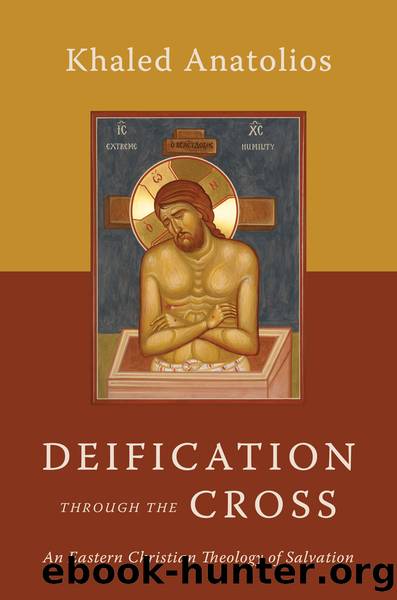Deification through the Cross by Khaled Anatolios

Author:Khaled Anatolios
Language: eng
Format: epub
Publisher: Wm. B. Eerdmans Publishing Co.
Published: 2020-01-15T00:00:00+00:00
1. For a more detailed account of the doctrinal controversies that surrounded the Councils of Nicaea and Constantinople, see Anatolios, Retrieving Nicaea. For other recent treatments, see R. P. C. Hanson, The Search for the Christian Doctrine of God: The Arian Controversy 318â381 (New York: T&T Clark, 1988); John Behr, The Nicene Faith (Crestwood, NY: St. Vladimirâs Seminary Press, 2004); Lewis Ayres, Nicaea and Its Legacy: An Approach to Fourth-Century Trinitarian Theology (Oxford: Oxford University Press, 2004).
2. Robert C. Gregg and Dennis E. Groh, Early Arianism: A View of Salvation (Philadelphia: Fortress, 1981). For a discussion of this proposal, see Anatolios, Retrieving Nicaea, 47â52.
3. Athanasius, C. Ar. 2.30. See Anatolios, Retrieving Nicaea, 48.
4. Rowan Williams, âAngels Unawares: Heavenly Liturgy and Earthly Theology in Alexandria,â in Studia Patristica, vol. 30, ed. Elizabeth A. Livingstone (Leuven: Peeters, 1997), 361.
5. Arius, Thalia (Rowan Williams, Arius: Heresy and Tradition, 2nd ed. [Grand Rapids: Eerdmans, 2002], 103).
6. Arius, Thalia (Williams, 101â2).
7. On the dialectical presentation of Jesusâs humanity and divinity in Hebrews, Luke Timothy Johnson comments: âChalcedon cannot simply be read off the pages of Hebrews, but the Chalcedonian understanding of the two natures in Christ can certainly be found in Hebrews. Hebrews demands of us some appreciation for the ontological dimensions of the story of Jesus.â Also: âAgainst this disjunctive and distorted set of Christologies, Hebrews demands taking Jesus as both fully God and fully human, if our profession is to be adequate to the mystery he revealsâ (Hebrews, 55).
8. Alexander of Alexandria, Ep. Alex. (hÄ philarchos), in Theodoret, Hist. eccl. (Urk. 14:28; ET: NPNF2 3:37; altered). In this section, I speak of human âsonship,â as a literal rendering of the Greek huiotÄs, in order to maintain the semantic link with huios (Son) as a christological title, just as Alexander himself does. Of course, there is no indication that Alexander understood such âsonshipâ as attainable only by males.
9. Alexander of Alexandria, Ep. Alex. 14.32 (NPNF2 3:38; altered).
10. Alexander of Alexandria, Ep. Alex. 14.4 (NPNF2 3:35; altered).
11. Alexander of Alexandria, Ep. Alex. 14.31 (NPNF2 3:38).
12. Athanasius, Syn. 51: âWhile all originated things have by participation the grace of God, He is the Fatherâs Wisdom and Word in whom all things participate. Consequently He who is the deifying and enlightening power of the Father, in whom all things are deified and enlivened, is not foreign in essence from the Father but coessentialâ (NPNF2 4:477; altered).
13. On the incomparability and imparticipability of the divine nature according to Arius, see R. Williams, Arius, esp. 215â29. On the dependence of arguments against Arius (particularly Athanasiusâs) on the conception of salvation as deification, see Maurice Wiles, âIn Defence of Arius,â Journal of Theological Studies 13, no. 2 (1962): 346.
14. Alexander of Alexandria, Ep. Alex. 14.48 (NPNF2 3:39).
15. Alexander of Alexandria, Ep. Alex. 14.52 (NPNF2 3:40).
16. Origen, Princ. 1.8.3.
17. For a more detailed exposition of Ariusâs doctrine as a transposition of Origenâs teaching on Christâs human soul, see R. Lorenz, Arius judaizans? Untersuchungen zur dogmengeschichtlichen Einordnung des Arius, Forschungen zur Kirchenâund Dogmengeschichte 31 (Göttingen: Vandenhoeck & Ruprecht, 1980), esp.
Download
This site does not store any files on its server. We only index and link to content provided by other sites. Please contact the content providers to delete copyright contents if any and email us, we'll remove relevant links or contents immediately.
Under the Banner of Heaven: A Story of Violent Faith by Jon Krakauer(1787)
The Early Centuries - Byzantium 01 by John Julius Norwich(1727)
The Amish by Steven M. Nolt(1560)
Taken by J. C. Owens(1554)
In Spirit and Truth (In Spiritu Et Veritate Series) by Reed Zoe(1542)
Play It as It Lays by Joan Didion(1500)
The Apogee - Byzantium 02 by John Julius Norwich(1434)
The Last Man in Russia by Oliver Bullough(1387)
David Sedaris Diaries by David Sedaris(1283)
A History of the Amish by Steven M. Nolt(1274)
The Dance of Change by unknow(1250)
Leaving the Witness by Amber Scorah(1244)
Fallen by unknow(1207)
Tears of the Silenced: A True Crime and an American Tragedy; Severe Child Abuse and Leaving the Amish by Misty Griffin(1191)
The Angel of Forest Hill by Cindy Woodsmall(1139)
Deep Blue by unknow(1135)
The Best of Amish Cooking by Phyllis Pellman Good(1130)
The Ariana Trilogy by Rachel Ann Nunes(1117)
Escape by Carolyn Jessop & Laura Palmer(1102)
